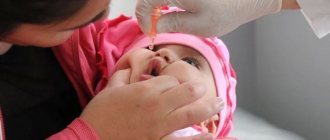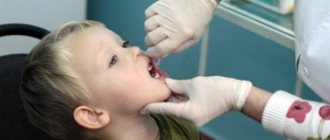Failure to be vaccinated against polio is not a basis for refusing a child to attend kindergarten. Children who have been vaccinated and children whose parents have refused vaccination have equal rights to attend an educational organization.
However, in some places the rights of children without polio vaccination are violated. Why? This is due to the legal illiteracy of the director of the kindergarten or his personal position - he believes that the rights of the vaccinated person are a priority, because he didn't break anything.
The situation is becoming even more tense now amid the spread of coronavirus. Children who have not been vaccinated against polio are increasingly excluded from visiting for a period of 60 days from the day any child in the group was vaccinated.
According to parents, the kindergarten management refers to some new norms that prohibit them from transferring students from one group to another, as was done before. And all this with reference to the threat of the spread of coronavirus.
How legal is this? – parents of unvaccinated children ask me.
Of course this is illegal. Let's look at the situation from a legal point of view.
How has the law changed? What are the rights of children without polio vaccination now?
Federal law, as before, does not make the right to education dependent on the presence or absence of a polio vaccination. All children are equal, all have the right to attend kindergarten.
At the same time, the Sanitary Rules SP 3.1.2951-11 “Prevention of Poliomyelitis” continue to apply. And clause 9.5. These rules establish that children who do not have information about immunization against polio, who have not been vaccinated against polio, or who have received less than 3 doses of polio vaccine, are separated from children vaccinated with OPV vaccine within the last 60 days for a period of 60 days from the date the children received their last vaccination OPV. They separate them, but do not exclude them from visiting or isolate them.
The term “separation” is neutral; it does not give rise to a conclusion about the priority of the rights of the vaccinated over the unvaccinated. But how this disunity is organized locally is another question.
Adequate leaders assess how many vaccinated pupils are in the groups, how many are unvaccinated or have received less than 3 doses of the vaccine, and taking this into account, decide which of them should be transferred to another group in kindergarten to ensure their separation.
In cases where the management of a kindergarten is legally illiterate and is opposed to unvaccinated children, they transfer the unvaccinated children to another group, even if in a particular case there are more of them than the newly vaccinated.
Of course, this approach cannot be called reasonable, because... it is not based on an objective and impartial assessment of circumstances, but on the personal preferences of the leader. But this is not the worst option.
Even more dangerous from the point of view of violation of children's rights are situations when unvaccinated people are excluded from visiting altogether. And now the fact of the threat of the spread of coronavirus has been used as an argument.
It was the situation with coronavirus that the heads of kindergartens began to refer to, refusing pupils to attend kindergarten and to transfer from one group to another for a period of 60 days.
And as practice shows, it is the unvaccinated pupils who are affected, and not the child who, 60 days after vaccination against polio, is a source of danger, due to which sanitary standards require separation in order to avoid the occurrence of vaccine-associated polio (VAP).
Prevention of polio
Dear parents!
In connection with numerous questions about the procedure for separating children in preschool educational organizations during vaccination against polio, we inform you that clause 9.5. sanitary rules SP 3.1.2951-11 “Prevention of Poliomyelitis” is intended to prevent infection and disease of unprotected (unvaccinated) children during their close contact with a child recently vaccinated with live oral polio vaccine (OPV).
The established procedure for separating unvaccinated children from vaccinated children for a certain period of time is aimed at protecting the life and health of the population; it allows maintaining a balance of interests of both persons who decide to vaccinate in order to protect against the threat of the emergence and spread of an epidemic, and persons who have taken advantage of the right granted by law and refused preventive vaccination. Failure to comply with this requirement poses a threat to the life or health of a child who has not been immunized against polio. Sanitary rules according to the Federal Law “On the Sanitary and Epidemiological Welfare of the Population” are normative legal acts establishing sanitary and epidemiological requirements (including criteria for the safety and (or) harmlessness of environmental factors for humans, hygienic and other standards), non-compliance with which creates threat to human life or health, as well as the threat of the emergence and spread of diseases (Article 1). Compliance with sanitary rules is mandatory for citizens, individual entrepreneurs and legal entities (clause 3 of Article 39).
The sanitary and epidemiological well-being of the population is ensured, in particular, through the prevention of diseases in accordance with the sanitary and epidemiological situation and the forecast of its changes, state sanitary and epidemiological regulation (Article 2 of the above Law).
Clause 9.5 of the sanitary rules SP 3.1.2951-11 “Prevention of Poliomyelitis” does not provide for the refusal to admit children who do not have information about immunization against polio to treatment-and-prophylactic and other organizations, but requires the need to separate them from children vaccinated with oral polio vaccine (OPV ) during the last 60 days, and is intended to prevent infection and disease in an unprotected (unvaccinated) child.
At the same time, if there are conditions for separation (temporary transfer of an unvaccinated child to another group where the risk of VAPP is excluded; prohibition of presence in general premises (music and sports halls, relaxation rooms, fairy tale rooms, environmental rooms, swimming pools, physiotherapy rooms, aromatherapy , exercise therapy, etc.); exclusion of “cross-staff” and other factors that may contribute to the occurrence of VAPP) and with the consent of the parents, a temporary transfer of an unvaccinated child to another group is possible. If the preschool educational institution does not have the above opportunities and there is a risk of the child contracting vaccine-associated polio, then it is necessary to exclude such a child from attending the preschool educational institution.
Based on the above, it follows that temporary exclusion from children who have been vaccinated with OPV within the last 60 days, for a period of 60 days from the date the children received their last OPV vaccination, is carried out in the interests of protecting the health of a child who has not been vaccinated against polio.
You need to know that polio is a serious infectious disease characterized by damage to the central nervous system, leading to persistent paralysis, disability and even death.
To prevent polio in Russia, as part of the national calendar of preventive vaccinations, children are immunized at 3 and 4.5 months with an inactivated vaccine, and at 6 months with a live oral polio vaccine (OPV). Children at 18, 20 months and 14 years of age also receive a booster vaccination against polio with a live polio vaccine. The IPV-OPV calendar is recognized as a safe and effective means of combating poliovirus infection by the World Health Organization.
Vaccine-associated paralytic polio (VAPP) is polio caused by vaccine viruses that are released from the intestines of a vaccinated child within 1 to 2 months after vaccination with oral polio vaccine. If vaccination with oral polio vaccine is carried out in a preschool institution, then a significant amount of vaccine viruses enters the environment during this time. Even with ideal observance of sanitary rules, it is very difficult to avoid contamination of environmental objects with viruses, which creates conditions for their circulation and the possibility of infection of unvaccinated children.
Vaccine-associated paralytic poliomyelitis occurs in unvaccinated children (mainly children with impaired immunity) in close contact with children recently (up to 2 months) vaccinated with live oral polio vaccine
What are the new standards for children attending kindergarten without vaccinations in the context of coronavirus?
The situation with coronavirus dictates its own conditions and authorities are taking different measures.
But no changes were made to the sanitary rules SP 3.1.2951-11 “Prevention of Poliomyelitis” to allow children without vaccination to be excluded from attending kindergarten.
However, during this time of increasing incidence due to coronavirus, other sanitary standards were adopted, which, probably, the management of the kindergarten began to interpret as allowing them to exclude children from attending.
Poliomyelitis: refusal of vaccination. Legality of suspending a child from attending kindergarten for 60 days
Among the refusals of all vaccinations, the greatest difficulty for parents is the refusal to vaccinate against polio, or rather not the refusal itself, but its consequences, since when vaccinated with a live polio vaccine, according to doctors, the child poses a risk of infection for unvaccinated children. And although this statement in itself is controversial, in practice doctors often violate the law and suspend children from attending kindergarten for a period of 60 days. Due to the fact that this period is long, and sick leave at work is not provided on such grounds, many parents, not being able to leave their social life for the specified time, experience difficulties in solving this problem. In this matter, one cannot do without the advice of a competent legal specialist. Let's try to figure out who is right after all and whether such a removal of a child from attending kindergarten is legal.
It is important to note here that in case of refusal of other vaccinations, the law “On Immunoprophylaxis of Infectious Diseases”
(hereinafter referred to as Law No. 157-FZ) the following restrictions are established (the list is exhaustive):
- a ban on citizens traveling to countries whose stay, in accordance with international health regulations or international treaties of the Russian Federation, requires specific preventive vaccinations;
- temporary refusal to admit citizens to educational and health institutions in the event of the occurrence of mass infectious diseases or the threat of epidemics;
- refusal to hire citizens for work or removal of citizens from work, the performance of which is associated with a high risk of contracting infectious diseases.
Based on the law, we see that refusal of any vaccination does not entail restrictions on visiting educational institutions, unless this concerns a temporary refusal to admit newly arriving children in the event of mass infectious diseases. Thus, the absence of vaccinations entails only the listed consequences and no others. Consequently, refusal to be vaccinated against polio cannot entail consequences unforeseen by federal legislation in the form of non-admission of children to educational institutions if there are recently vaccinated children there. If we consider this restriction using the example of polio, then in order for a newly arriving child not to be allowed into the staff of an educational institution, it is necessary that the disease with polio be widespread among students. Here we need to clarify one detail: diseases of the “wild” polio virus have not been registered in our country since 1997, that is, all these problems are associated specifically with vaccine polio. In other words, certain benefits created by our medicine are used to openly discriminate against certain layers of citizens who had the courage to refuse these “benefits.”
Where did the demand to exclude a child who has not been vaccinated against polio from attending kindergarten come from? Let's read the instructions for the polio vaccine. POLIOMYELITE VACCINE, oral, types 1, 2, 3, oral solution (the text of the instructions is publicly available on the Internet and can be found). Excerpt from the instructions for this vaccine:
“Side effects: There are practically no side effects from the administration of the vaccine. In some vaccinated people who are predisposed to allergic reactions, allergic complications in the form of a rash such as urticaria or Quincke's edema can extremely rarely be observed. The occurrence of vaccine-associated paralytic poliomyelitis (VAPP) is extremely rare both in vaccinated people and in persons in contact with vaccinated people. To limit the circulation of the vaccine virus among people surrounding the vaccinated child, parents should be explained the need to observe the rules of personal hygiene of the child after vaccination (separate bed, potty, bedding, clothes separate from other children and the need to isolate the vaccinated child in the family from immunodeficiency patients).”
So, it turns out that there is an extremely rare possibility of contracting vaccine-induced polio. Note that both vaccinated children and unvaccinated children are susceptible to this when they come into contact with vaccinated people. Consequently, the application of sanitary rules SP 3.1.2951-11 “Prevention of Poliomyelitis” is aimed at reducing such risks. In accordance with the requirements of sanitary rules in section IX “Measures for the prevention of vaccine-associated cases of polio (VAPP)”, in order to exclude cases of infection with vaccine polio, unvaccinated children are separated from vaccinated children, as stated in paragraph 9.5: “p. 9.5. In medical organizations, preschool organizations and general educational institutions, summer health organizations, children who do not have information about immunization against polio, who have not been vaccinated against polio, or who have received less than 3 doses of polio vaccine, are separated from children vaccinated with OPV vaccine within the last 60 days for a period 60 days from the date the children received their last OPV vaccine.”
Note that the key phrase in the above paragraph is “unvaccinated children are separated from vaccinated children.” They separate people, not remove them. That is, this means that your child should be transferred to another group, and not prohibit you from attending kindergarten at all.
In practice, it often happens that the kindergarten administration has not created conditions for separating children, for example, there is no place in a group that suits your age or, in principle, there is no other group, for example, if the kindergarten is located in a small locality, such as a village or district center, and there is only one group of children of each age. In this situation, this is not the problem of the child’s parent, but the problem of the kindergarten administration. Because in this case everything is simple: create the conditions, and then vaccinate. There are no conditions for disunity - don’t vaccinate. If you suddenly need the administration or honey. workers are trying to serve a notice that your child is being suspended from visiting the kindergarten, demand an official order to remove the child and go with it to the prosecutor's office or court. In this case, law enforcement agencies will be on your side, since the law does not provide such a basis for removing a child from attending kindergarten.
I also recommend doing the following: Firstly, to contact the prosecutor's office and the court, you will need to provide evidence of your illegal removal. The main evidence here is the removal order signed by the manager. Please remember that any other written or oral instructions have no legal force and are advisory in nature. That is, when you contact the prosecutor's office, an inspection will be carried out, during which all the necessary information will be requested from the kindergarten administration, as a result of which it will turn out that no one has officially suspended you, and you do not voluntarily go to the kindergarten and the administration has nothing to do with it . Based on the results of this inspection, a conclusion will be given that no violations of the law have been identified. Naturally, you will turn out to be extreme, and no one will bear responsibility for this. If, before the official order of removal, you suddenly encounter physical opposition to admitting you to a child care institution, I recommend drawing up an act. To draw it up, you will need two witnesses (the form of the act is in the appendix).
Next, I also recommend getting a voice recorder of the conversation with the manager as evidence. She must be informed that a recording is being made, but her consent to the recording will not be required, since it is only needed if you decide to publish this recording in the media. In the conversation, it is worth mentioning the illegality of removing a child from attending kindergarten with references to the law.
If the head agrees with your arguments and does not remove your child by drawing up an illegal order, you have two options on what to do. You can ask to separate your child from vaccinated children by transferring him to another group for 60 days, or ask to remain in your group and write a receipt (example in the appendix) stating that you are aware of the possible consequences and take responsibility. This is especially true if not the whole group is being vaccinated, but one or two children, and any risk in this case tends to zero, and transferring to another group will cause stress to your child.
The text of the receipt can be drawn up in any form; the key point here is that you are familiar with the consequences and assume all risks. Attached is an approximate text of the receipt; you can use it as a basis or create your own version.
Download a sample act on the exclusion of a child from an educational institution.
Receipt of refusal to vaccinate a child and warning of possible consequences, sample download.
Elena's contacts for all parents who need advice or help, +7-921-634-55-35.
BCG and polio: without which vaccinations will they not be accepted into kindergarten?
On September 1, schoolchildren will go to school, and preschoolers will go to kindergarten. Doctor Natalya Dolgopolova talks about what vaccinations are needed to go to kindergarten, what to do if they were not done as scheduled, and whether it is possible to save on vaccinations in a private clinic.
Useful Mela newsletter twice a week: Tuesday and Friday
SUBSCRIBE
The national calendar includes preventive vaccinations against ten infections. From the point of view of importance when entering kindergarten, they can be divided into three groups: vaccination against tuberculosis, vaccination against polio and other vaccinations.
It is most difficult for those children whose certificates do not contain information about the Mantoux test and polio vaccinations to get to kindergarten on time. Refusal or medical withdrawal from other vaccinations rarely limits a child’s rights to stay in a peer group.
To the garden without Mantoux and BCG test
In the first days or months of a child’s life, they are usually vaccinated against tuberculosis with the BCG vaccine, and a year later they are given Mantoux. The Mantoux test is not a vaccination, but a diagnostic test. Its main goal is to identify among healthy children those who may have tuberculosis. For this purpose, children under seven years of age inclusively undergo the Mantoux test annually.
If a child is not vaccinated against tuberculosis, this will not prevent him from going to kindergarten on a general basis, only Mantoux will have to be done not once, but twice a year. If for some reason he does not have a Mantoux test, this is a serious problem: a child who has not been examined for tuberculosis will not be accepted into kindergarten by law.
What to do?
If the Mantoux test is not done, it is necessary to obtain a phthisiatrician’s conclusion that the child has no signs of active tuberculosis. For this you need: the results of fluorography of the parents and a diaskintest or x-ray examination of the child’s chest.
If you refuse standard tests and x-rays, you can give your child a T-SPOT.TB test, the results of which are considered an equivalent replacement for the Mantoux test or Diaskintest. However, the T-Spot test is a paid analysis and cannot be done under the compulsory medical insurance policy.
You have the right to refuse any type of examination for tuberculosis, but in this case the TB specialist will not be able to exclude the disease, even if the child feels well and looks healthy. Such a child is not allowed into the children's group.
Polio-free
Vaccination against polio often becomes the cornerstone on which all plans for kindergarten are broken. Full vaccination takes three months. First, two doses of inactivated vaccine are administered, followed by a third dose of live vaccine in the form of drops in the mouth. The intervals between them are 45 days. According to the schedule, children are immunized at the ages of three, four and a half and six months. However, in most Russian cities there is a shortage of inactivated polio vaccine, so the child may well not be vaccinated against polio by the time he is admitted to kindergarten.









